- Home
- Quizzes
- My Quiz Activity
- Newsletters
- Sports Betting
- MY FAVORITES
- Add Sports/Teams
- SPORTS
-
NFL
- NFL Home
- Arizona Cardinals
- Atlanta Falcons
- Baltimore Ravens
- Buffalo Bills
- Carolina Panthers
- Chicago Bears
- Cincinnati Bengals
- Cleveland Browns
- Dallas Cowboys
- Denver Broncos
- Detroit Lions
- Green Bay Packers
- Houston Texans
- Indianapolis Colts
- Jacksonville Jaguars
- Kansas City Chiefs
- Las Vegas Raiders
- Los Angeles Chargers
- Los Angeles Rams
- Miami Dolphins
- Minnesota Vikings
- New England Patriots
- New Orleans Saints
- New York Jets
- New York Giants
- Philadelphia Eagles
- Pittsburgh Steelers
- San Francisco 49ers
- Seattle Seahawks
- Tampa Bay Buccaneers
- Tennessee Titans
- Washington Commanders
-
MLB
- MLB Home
- Arizona Diamondbacks
- Atlanta Braves
- Baltimore Orioles
- Boston Red Sox
- Chicago White Sox
- Chicago Cubs
- Cincinnati Reds
- Cleveland Guardians
- Colorado Rockies
- Detroit Tigers
- Houston Astros
- Kansas City Royals
- Los Angeles Angels
- Los Angeles Dodgers
- Miami Marlins
- Milwaukee Brewers
- Minnesota Twins
- New York Yankees
- New York Mets
- Oakland Athletics
- Philadelphia Phillies
- Pittsburgh Pirates
- San Diego Padres
- San Francisco Giants
- Seattle Mariners
- St. Louis Cardinals
- Tampa Bay Rays
- Texas Rangers
- Toronto Blue Jays
- Washington Nationals
-
NBA
- NBA Home
- Atlanta Hawks
- Boston Celtics
- Brooklyn Nets
- Charlotte Hornets
- Chicago Bulls
- Cleveland Cavaliers
- Dallas Mavericks
- Denver Nuggets
- Detroit Pistons
- Golden State Warriors
- Houston Rockets
- Indiana Pacers
- Los Angeles Clippers
- Los Angeles Lakers
- Memphis Grizzlies
- Miami Heat
- Milwaukee Bucks
- Minnesota Timberwolves
- New Orleans Pelicans
- New York Knicks
- Oklahoma City Thunder
- Orlando Magic
- Philadelphia 76ers
- Phoenix Suns
- Portland Trail Blazers
- Sacramento Kings
- San Antonio Spurs
- Toronto Raptors
- Utah Jazz
- Washington Wizards
-
NHL
- NHL Home
- Anaheim Ducks
- Arizona Coyotes
- Boston Bruins
- Buffalo Sabres
- Calgary Flames
- Carolina Hurricanes
- Chicago Blackhawks
- Colorado Avalanche
- Columbus Blue Jackets
- Dallas Stars
- Detroit Red Wings
- Edmonton Oilers
- Florida Panthers
- Los Angeles Kings
- Minnesota Wild
- Montreal Canadiens
- Nashville Predators
- New Jersey Devils
- New York Islanders
- New York Rangers
- Ottawa Senators
- Philadelphia Flyers
- Pittsburgh Penguins
- San Jose Sharks
- Seattle Kraken
- St. Louis Blues
- Tampa Bay Lightning
- Toronto Maple Leafs
- Vancouver Canucks
- Vegas Golden Knights
- Washington Capitals
- Winnipeg Jets
- NCAAF
- NCAAM
- Boxing
- Entertainment
- Lifestyle
- Golf
- MMA
- Soccer
- Tennis
- Wrestling
- More Sports
- RESOURCES
- My Account
- YB on Facebook
- YB on Twitter
- YB on Flipboard
- Contact Us
- Privacy Policy
- Terms of Service
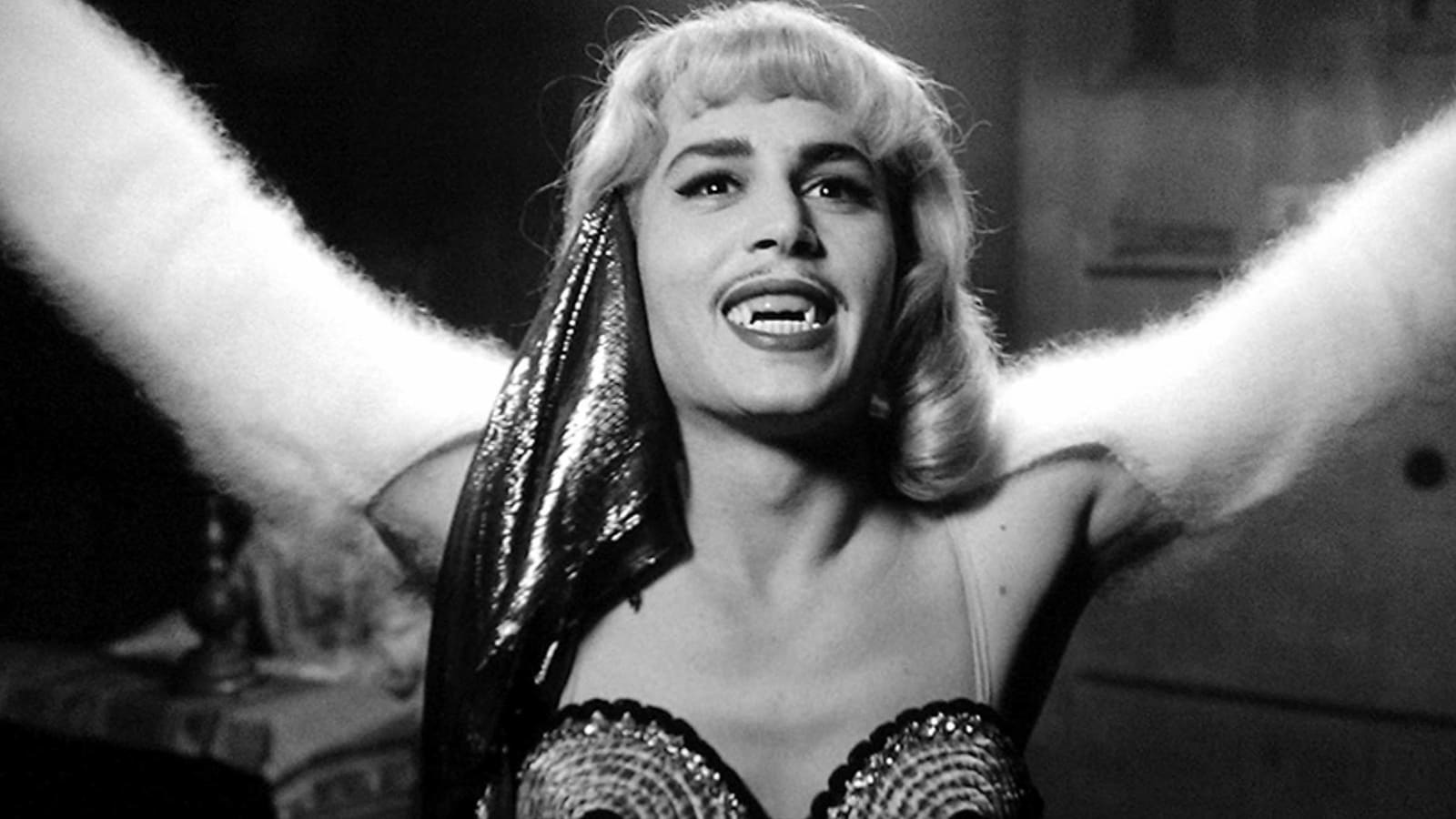
Tim Burton is one of the more confounding filmmakers of the past 40 years. He was fired from Disney in the early '80s for violating their family-friendly aesthetic, and then boomeranged back to the studio in the '90s with a biopic about a cross-dressing failure of a filmmaker. He broke all of the Hollywood rules, inspired a generation of outcasts to find their inner-weirdo and then sold out hard. But he's still out there making movies, the most recent being his live-action remake of Disney's delightfully simple "Dumbo." In honor of his persistence, let's rank Burton's films in order of weirdness.
"Batman Returns" (1991)

Generally given free rein on his Batman sequel, Burton gave the world the kinkiest superhero movie ever made. Narratively, it’s a shambles. Selina Kyle/Catwoman (Michelle Pfeiffer) and Oswald Cobblepot/The Penguin (Danny DeVito) dominate, while Bruce Wayne is relegated to supporting player status. “Batman Returns” is at its best when it focuses on the doomed romance between Kyle and Wayne, lost souls who spend their nocturnal hours clad in skin-tight latex; it runs aground when it deals with the standard-issue super-villain business. This marked the end of Burton’s Caped Crusader, which, given WB’s desire to take the franchise in a more cartoonish direction, was for the best.
"Pee-wee's Big Adventure" (1985)

Warner Bros gave the two weirdest kids on the block $7 million to indulge their every kitschy whim, resulting in a sleeper box-office smash that went on to become one of the more beloved comedies of the 1980s. The character was the stunted brainchild of star and co-writer Paul Reubens, but the gleefully garish aesthetic defined Burton as Hollywood’s preeminent (and, most importantly, profitable) weirdo right out of the gate. Key to the film’s charm: a wildly exuberant score from composer Danny Elfman that’s half Nino Rota, half Carl Stalling. Burton and Elfman are the oddball flipside to Hitchcock and Herrmann.
"Beetlejuice" (1988)

Burton’s 1988 follow-up to “Pee-wee’s Big Adventure” is a raucous romp through the funhouse mirror of Burton’s brain. It’s “dark” and “disturbing” in a multiplex-friendly way, a lighthearted gateway-to-gothdom that’s hugely responsible for the hundreds of Hot Topic stores that spread like kudzu through the nation’s malls over the ensuing decade. Michael Keaton plays the mischievous title demon with the lunatic ferocity of a Chuck Jones drawing sprung to life, but, in terms of tone and design, this is primarily a director’s showcase. It’s a master class in bizarro world building that established Burton as a brand – which, in terms of his growth as a storyteller, might’ve been more of a curse than a blessing.
"Mars Attacks!" (1996)
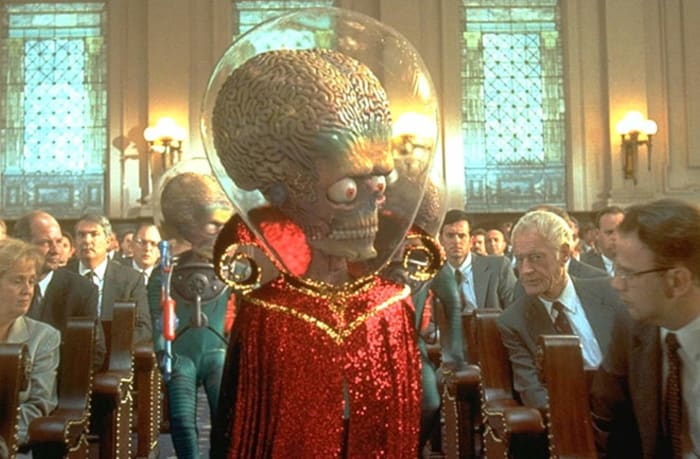
This hilariously gaudy, star-studded goof on alien invasion movies drew its inspiration from a 1960s series of Topps trading cards, and Burton revels in this dubious pedigree. Given that it was released five months after the more sober-mindedly stupid “Independence Day,” audiences largely rejected it; they simply weren’t ready for Burton’s unrepentantly moronic depiction of diminutive Martians shouting “Ack-Ack” and disintegrating A-list movie stars with their ray guns. “Mars Attacks!” has aged remarkably well, and stands as one of Burton’s most breezily entertaining films.
"Edward Scissorhands" (1990)

Johnny Depp plays a sullen outcast with shears for hands and the wounded heart of an artist in Burton’s soul-baring follow-up to “Batman.” The film’s pastel suburbia is a drab nightmare that reflects the director’s nostalgia and abhorrence for his Burbank, Calif., upbringing; it’s a tacky, surface-obsessed town that abides this pasty outsider until he gets comfortable enough to fall in love with Winona Ryder’s prom-queen pretty Kim. Danny Elfman’s lushly romantic score is as good as movie music gets, and Burton gives his hero, Vincent Price, a beautifully melancholy big-screen swan song.
"Sleepy Hollow" (1999)

Burton scratches his Hammer Horror itch, and at the very least nails the gory, autumnal aesthetic of those Christopher Lee/Peter Cushing classics. The film is based on the Washington Irving yarn. Burton conjures up a legitimately horrifying Headless Horseman, and, in concert with cinematographer Emmanuel Lubezki, delivers his most handsomely shot movie. Alas, “Sleepy Hollow” is all mood.
"Charlie and the Chocolate Factory" (2005)

Burton and Johnny Depp capture the misanthropy of Roald Dahl’s Willy Wonka more palpably than Mel Stuart and Gene Wilder did in their 1971 adaptation, which is probably why this version has faded from view over the last decade. Alex McDowell’s production design is astonishing in its own right, and Depp’s fiendishly aloof take on Wonka is fascinating until he’s given a backstory that redeems his nastiness. A few tweaks here and there, and this would’ve been unvarnished Dahl.
"Sweeney Todd: The Demon Barber of Fleet Street" (2007)

Burton’s second Hammer Horror homage finds an ideal vehicle in Stephen Sondheim’s brilliant musical about a barber who cuts heads below the chin. It’s a gorgeously shot and designed film, but Burton ill advisedly cast mostly non-singers in a production that requires precise intonation. This is an excruciating missed opportunity.
"Frankenweenie" (2012)
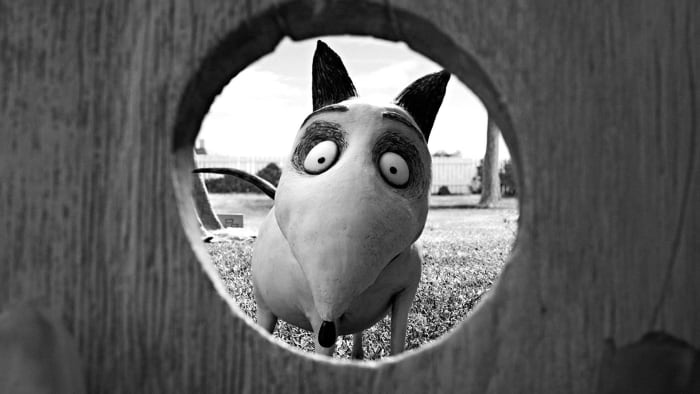
Kudos to Burton for convincing Disney to produce a black-and-white, feature-length, stop-motion animated version of the really weird live-action movie that launched his career. It’s not bad, which is the best that can be said about his movies anymore. The 3-D animation is unnecessary, but professionally done. When Alfred Hitchcock remade “The Man Who Knew Too Much,” he at least had the crowd-pleasing wherewithal to commission a hit song for Doris Day.
"Corpse Bride" (2005)

This is a weird endeavor in that Burton apparently thought he could outdo Henry Selick (who directed the Burton-produced “The Nightmare Before Christmas” and “James the Giant Peach”) in the stop-motion animation department. Despite the involvement of screenwriters Caroline Thompson and John August, it lacks the heart and the purpose of those films. It’s a gorgeous piece of nothing.
"Planet of the Apes" (2001)

This is a terrible movie, but credit where it’s due: casting Helena Bonham Carter as a distressingly sexy primate was some kind of masterstroke. Burton goes for the big gesture at the end with a Lincoln Memorial occupied by the film’s simian villain, Thade (Tim Roth), but it’s an empty provocation at the end of a needless remake that is notable only for Rick Baker’s exceptional makeup artistry.
"Alice in Wonderland" (2010)

Hot Topic: The Movie. Disney shelled out in the neighborhood of $200 million to make $1 billion, and Burton delivered on his end of the bargain. It’s 108 minutes worth of meaningless eye candy with a tenuous connection to Lewis Carroll’s novels. Depp plays the Mad Hatter with expected aplomb. Matt Lucas shines as Tweedledee and Park Chan-wook’s Tweedledum. Mia Wasikowska was three years away from melting our brains in “Stoker."
"Dark Shadows" (2012)
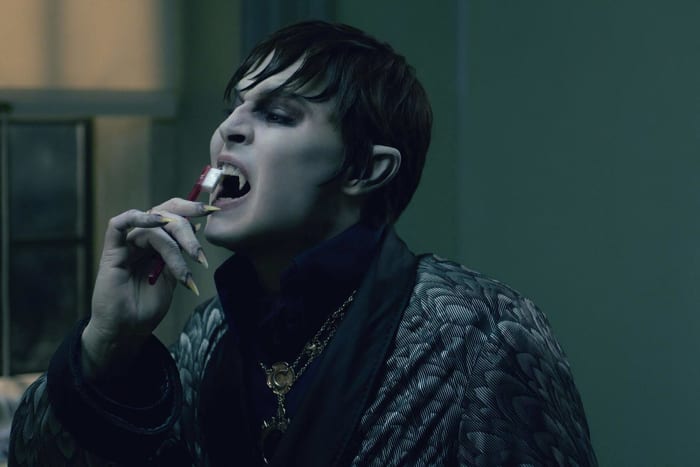
Burton’s most entertaining film since “Mars Attacks!” benefits tremendously from the sparks set off by Johnny Depp’s Barnabas Collins and Eva Green’s villainess, Angelique Bouchard. It’s as shallow and tawdry as you’d expect a film based on a soap opera to be, and shame on you if you expected more than a stylish shrug. If you’re worried that Burton isn’t engaging with his material on a thematic level at this point, you’ve evidently taken a powder on his movies over the past decade.
"Miss Peregrine's Home for Peculiar Children" (2016)

Jane Goldman’s adaptation of Ransom Rigg’s novel is one of the more cleanly structured screenplays Burton has worked with, and he responds with a visually inventive alt-version of the X-Men that makes you wish Fox would throw Bryan Singer overboard and give this stalled-out visionary a shot at rediscovering himself in another comic book franchise. Who owns Fox now? Oh right.
"Big Fish" (2003)

Initially intended for the papa-preoccupied Steven Spielberg, John August’s script for “Big Fish” eventually wound up with Burton, who tapped into the recent death of his father to make one of his most emotionally resonant films. Burton considered the film therapy, but it plays like an emotionally honest rendition of “Forrest Gump.” Burton and August attempt to square tall tales with the truth as a means of understanding a man who lived a full life in his mind.
"Batman" (1989)
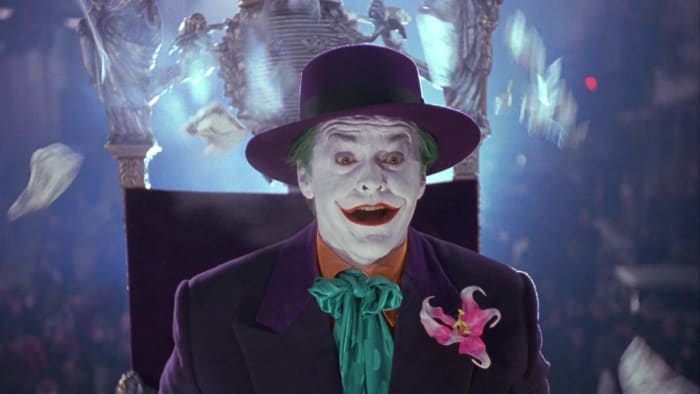
Burton had his hands full on his third feature: a headstrong legend in Jack Nicholson, a meddlesome producer in Jon Peters and the franchise hopes (budgeted at a then-towering $48 million) of an entire studio. But he barely held it all together, and wound up creating the template for the modern superhero movie. Technically, “Batman” is held together with spit and glue; the CGI revolution was still four years away, which required Burton to use his animation background for some visual effects shots here and there. It has a handmade, almost improvisational feel at times, which lends it a rough charm that eludes today’s blockbusters. It’s also heavily tilted in favor of its villain, and devoid of memorable action set pieces.
"Ed Wood" (1994)

Burton’s masterpiece is also one of the most down-to-earth movies he has made. For decades, Ed Wood was derided as the worst filmmaker of all time; his shoestring-budget genre films (e.g. “Plan 9 from Outer Space”, “Glen or Glenda” and “Bride of the Monster”) were notorious for their cardboard sets, clumsy writing and, of course, appearances by the out-to-pasture horror legend, Bela Lugosi. But Burton and the screenwriting duo of Scott Alexander and Larry Karaszewski feel an outsider’s kinship with Wood, and an admiration for his scrappily sincere movies. They treat Wood’s coterie of discarded eccentrics with a dignity that was by and large denied them by society.
"Big Eyes" (2014)

Burton re-teamed with the “Ed Wood” screenwriters Scott Alexander and Larry Karaszewski for this straightforward biopic about painter Margaret Keane, whose kitschy paintings have adorned the walls of tackily appointed living rooms for decades. Amy Adams is sensational as the cruelly maligned visionary whose work is co-opted by her husband, Walter (a way-too-broad Christoph Waltz), but Burton feels more constricted than engaged; he doesn’t vibe with Keane the way he did with Wood, and the film tends to plod as a result.
Jeremy Smith is a freelance entertainment writer and the author of "George Clooney: Anatomy of an Actor". His second book, "When It Was Cool", is due out in 2021.
More must-reads:
Trending in Entertainment
Customize Your Newsletter
 +
+
Get the latest news and rumors, customized to your favorite sports and teams. Emailed daily. Always free!
Use of this website (including any and all parts and
components) constitutes your acceptance of these
Terms of Service and Privacy Policy.

